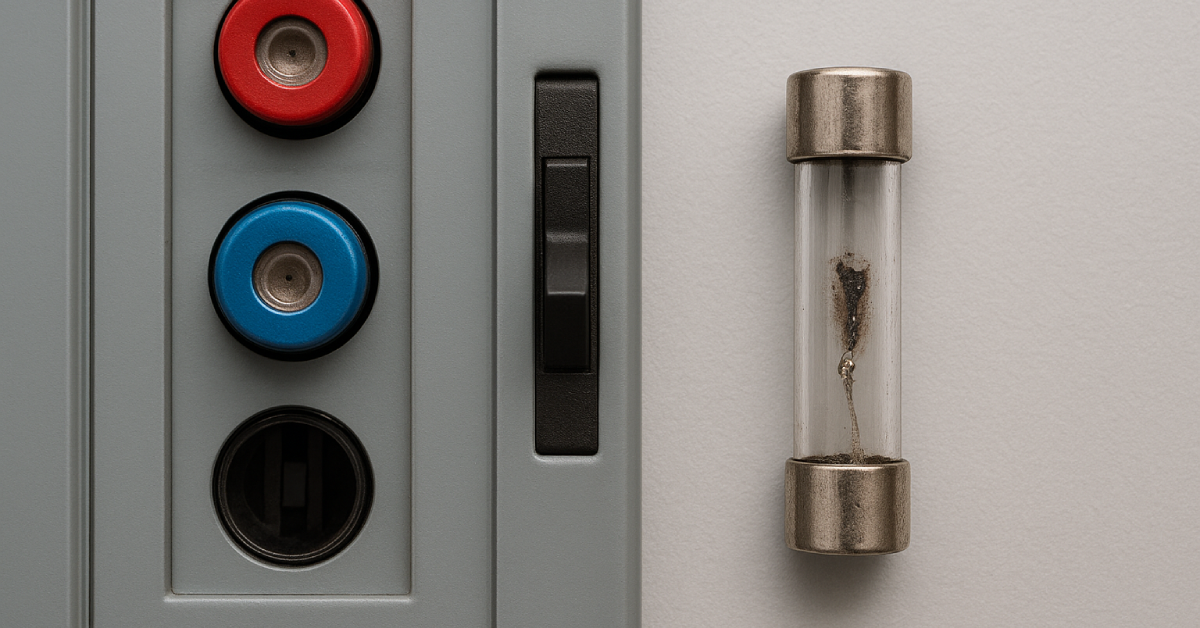When something in your home suddenly stops working — the lights flicker off, or an outlet goes dead — your first instinct may be to check the breaker box. But what if nothing is tripped? For many homeowners, the next question is: what is a fuse in electrical panels, and could that be the problem?
It’s a common source of confusion. Most people have heard the term “fuse,” but few actually know what it does or how to tell when it has blown. Misunderstanding this small but crucial device can leave you worried, frustrated, or tempted to try risky DIY fixes.
That’s where this guide comes in. In this article, you’ll learn exactly what a fuse is in electrical panels, what a fuse does, what a fuse is used for, and how to safely tell if yours is blown. We’ll also break down when it’s safe to try a simple check yourself and when to call a licensed electrician like Super Fast Electric.
What Is a Fuse in Electrical Panels?
At its core, a fuse is a safety device. It’s designed to protect your electrical system from overloads and prevent fire hazards.
When too much current flows through a circuit, the fuse’s thin internal wire heats up and melts — effectively breaking the circuit and stopping the flow of electricity. This protects your wiring, appliances, and most importantly, your home.
In other words, the purpose of a fuse is to act like a guardrail: it sacrifices itself to stop dangerous current from damaging your system.
What Does a Fuse Look Like?
Fuses aren’t always obvious. Depending on the age of your home, you might see:
- Screw-in fuses that look like oversized light bulbs.
- Cartridge fuses shaped like small cylinders.
- Modern breakers (common in newer homes), which serve the same purpose but reset with a switch instead of replacement.
If you’re asking “what’s a fuse?” — it’s essentially any device in your electrical panel designed to break the circuit when too much current flows through.
What Does a Fuse Do in Everyday Use?
Many homeowners ask: “what does a fuse actually do?”
Here’s the simple answer:
- It prevents overheating and fires caused by overloaded circuits.
- It protects sensitive appliances from damage.
- It ensures your electrical system operates within safe limits.
Without a working fuse, even a small overload could cause serious damage. That’s why recognizing when one has blown is so important.
How to Tell If a Fuse Is Blown
You don’t need to be an electrician to spot the signs of a blown fuse. Common indicators include:
- Loss of power to part of your home, while other areas still work.
- Burn marks or discoloration on the fuse or panel.
- A visible break in the fuse’s internal wire (for clear-glass fuses).
- A burnt smell near the panel.
⚠️ Important: Never poke, prod, or attempt to remove wires from your panel unless you are trained. The panel contains live electricity that can be deadly.
Safe Troubleshooting Steps for Homeowners
If your outdoor lights or appliances stop working but the breaker hasn’t tripped, here are a few safe checks you can try before calling a professional:
- Unplug Devices: Overloaded appliances can cause fuses to blow. Try unplugging a few items to reduce strain.
- Check for GFCI Resets: Sometimes a nearby GFCI outlet has tripped, cutting power to other outlets. Press the “reset” button and test again.
- Look for Obvious Damage: If you see scorch marks or melted components, stop immediately and call a professional.
If none of these steps restore power, it’s time to call an electrician.
When to Call a Licensed Electrician
Some issues are minor; others are dangerous. Here are cases where you should not attempt DIY fixes:
- The fuse shows burn marks or melted parts.
- Power continues to cut out repeatedly.
- You hear buzzing or crackling sounds from the panel.
- You’re unsure whether your home even uses fuses or breakers.
In these situations, the safest move is to call a licensed electrician. At Super Fast Electric, we handle these issues every day for homeowners across Orlando, Altamonte Springs, Longwood, and the greater Central Florida area.
Why Understanding Fuses Matters
It’s easy to overlook fuses because they’re small and hidden away. But knowing what a fuse is used for and how to recognize when one has blown can save you time, money, and stress. More importantly, it helps keep your home safe from electrical hazards.
Super Fast Electric: Your Local Electrical Experts
At Super Fast Electric, we believe homeowners shouldn’t have to struggle with confusing or unsafe electrical problems. Whether you’re dealing with a blown fuse, tripped breaker, or any other issue, our licensed electricians provide fast, reliable, and professional service.
We’re proud to have 700+ 5-star reviews from Central Florida homeowners who trust us to keep their homes safe and powered.
👉 If you want to speed this process up and get your fuse issues resolved quickly, get in touch with our team today.




